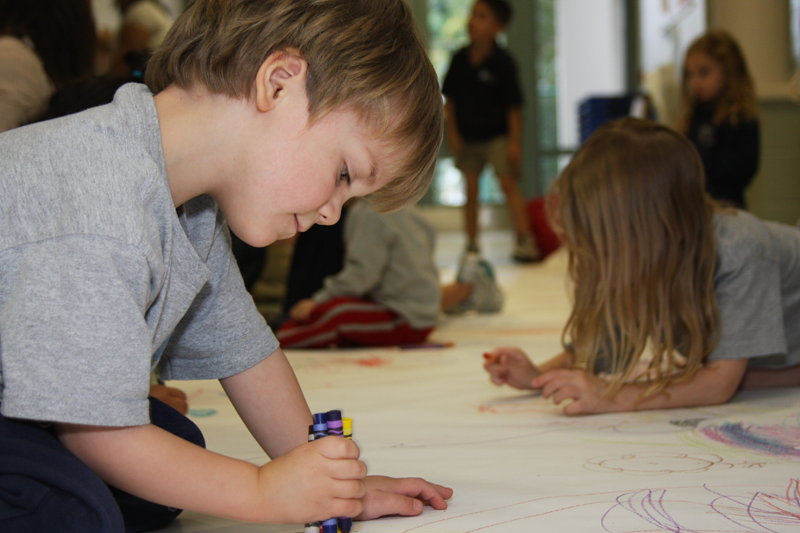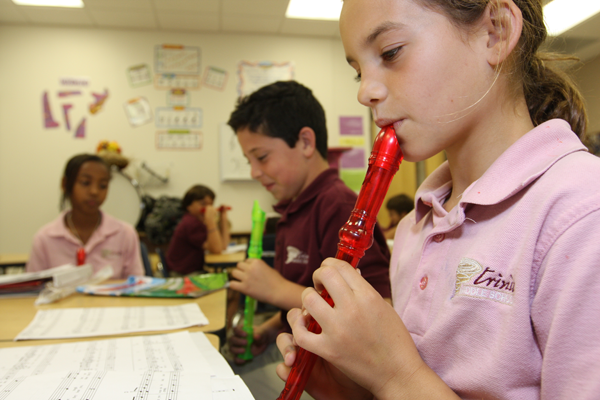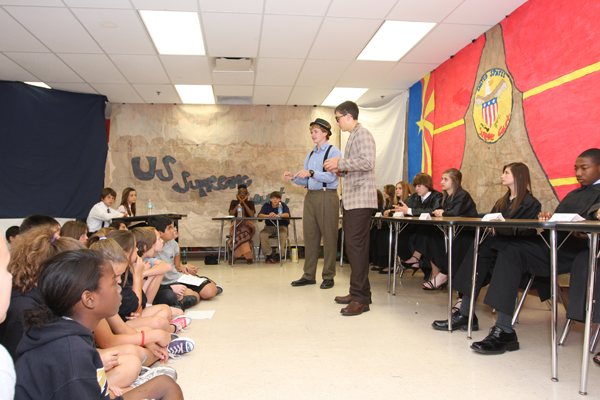Cultural Arts
 
Lower School
The students are engaging in the study of water. The classroom teacher, along with the Art teacher, begins a discussion with the children at morning  meeting. The discussion about water at this point has taken place for many weeks. The children decide that they would like to create a mural that depicts the important information they have learned. Through the display of the mural, the children will be able to share their learning with others.
meeting. The discussion about water at this point has taken place for many weeks. The children decide that they would like to create a mural that depicts the important information they have learned. Through the display of the mural, the children will be able to share their learning with others.
As they collect the materials they will need, conversation continues with the Art teacher about shape, line, form, and color so they can incorporate these elements in their mural. The Music teacher also participates in some of the discussions about water and incorporates songs and dancing about what they have learned that the children either create themselves or are taught by the Music teacher. The Spanish teacher integrates the language in the naming of fish, different parts of the water under the sea, and regions where different kinds of fish may be found. This integration adds to their vocabulary with meaning.
 
Middle School The same process is replicated in the studies integration throughout the grades. The Third grade, for example, studies United States history, immigration and the important part it played in the development of our country, and its regions. At morning meeting the discussions focus around this subject and conversations occur about how they think they can represent what they have learned. Some outcomes of this study, with the help of the Art, Music, and Spanish teachers, are the creation of relief maps, learning patriotic songs, and presentations to others in order to share what they have learned. They continue to build their Spanish vocabulary as it relates to the study.
The same process is replicated in the studies integration throughout the grades. The Third grade, for example, studies United States history, immigration and the important part it played in the development of our country, and its regions. At morning meeting the discussions focus around this subject and conversations occur about how they think they can represent what they have learned. Some outcomes of this study, with the help of the Art, Music, and Spanish teachers, are the creation of relief maps, learning patriotic songs, and presentations to others in order to share what they have learned. They continue to build their Spanish vocabulary as it relates to the study.
Upper School The core classes in the Upper School share what they learn in a grander way. The seventh grade, for example, studies Civics. The students will create representations depicting different components that make up our Government and American life. As the study of this subject unfolds, the Art and Music are reflected in their work.
The core classes in the Upper School share what they learn in a grander way. The seventh grade, for example, studies Civics. The students will create representations depicting different components that make up our Government and American life. As the study of this subject unfolds, the Art and Music are reflected in their work.
Upper School Electives
The elective classes are designed to give the Upper School student exposure to unique subject areas that go beyond the core curriculum. The Upper School electives have a course structure of discovery learning activities. The student delves into a multitude of subject areas that "round out" the life of the Trinity student. The courses chosen are meant to expose them to further explore interests they might have thought of pursuing as they continue their education in high school and college.
Some examples of the electives offered are:
The Millennium Project: This is a United Nations Initiative that fosters involvement on the part of students to further their understanding of global issues. Our students research the projects offered by the United Nations program and target one of the projects to work on for the year.
Forensic Science: This is an investigative approach to solving problems using science as a catalyst.
Horticulture: Through improving our campus landscape, the students research indigenous plants and landscape architecture design.
iMovie and the Theatre Arts: These classes expose our students to the world of movie creation, drama, and music.

